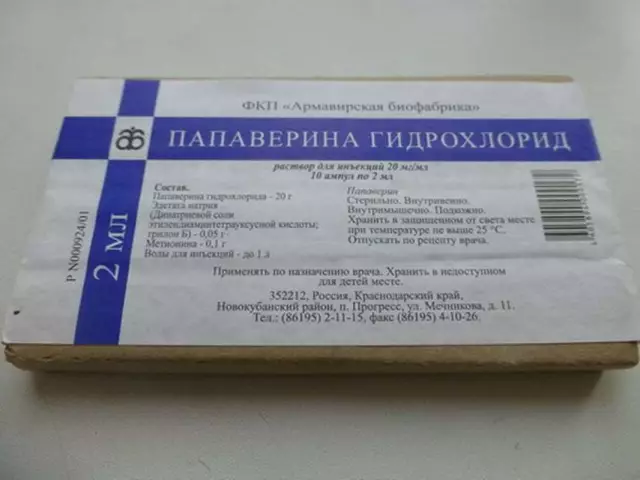- Author Rachel Wainwright wainwright@abchealthonline.com.
- Public 2023-12-15 07:39.
- Last modified 2025-11-02 20:14.
Papaverine
Instructions for use:
- 1. Pharmacological action
- 2. Release form
- 3. Indications for use
- 4. Contraindications to use
- 5. Method of application
- 6. Description of side effects
- 7. Storage conditions
Prices in online pharmacies:
from 5 rubles.
Buy

Papaverine is a combined antihypertensive and antispasmodic drug with an analgesic effect.
pharmachologic effect
The active substance Papaverine has an antihypertensive, analgesic and anticonvulsant effect.
The use of Papaverine helps to reduce the tone of the smooth muscles of the internal organs of the urinary, respiratory, reproductive system and blood vessels, dilate the arteries and increase blood flow.
In addition, according to the instructions, Papaverine has a hypotensive effect. In high doses, the active component of the drug has a sedative effect, slows down intracardiac conduction, and also helps to reduce the excitability of the heart muscle. In moderate therapeutic doses, the drug has a mild effect on the central nervous system.
The safety and efficacy of using Papaverine during pregnancy and lactation has not been studied.
Release form
Papaverine is available in several dosage forms:
- Solution for injection (injections), in 2 ml ampoules, containing 20 mg of the active substance;
- Rectal suppositories containing 20 mg of active substance;
- Tablets containing 40 mg of active substance;
- Tablets for children containing 10 mg of the active substance.
Indications for the use of Papaverine
According to the instructions, Papaverine is used for smooth muscle spasms:
- Peripheral vessels - with endarteritis;
- Bronchus - with bronchospasm;
- Cerebral vessels;
- Abdominal organs - with renal colic, pylorospasm, cholecystitis, spastic colitis;
- Heart - with angina pectoris;
As an adjuvant, the use of Papaverine is indicated for premedication.
Contraindications to the use of Papaverine
According to the instructions, Papaverine is contraindicated for use in old age, children under 6 months, as well as for:
- AV blockade;
- Severe liver failure;
- Glaucoma;
- Hypersensitivity to papaverine components.
According to indications, Papaverine is used with caution:
- With chronic renal failure;
- With hypothyroidism;
- With supraventricular tachycardia;
- After traumatic brain injury;
- With insufficient adrenal function;
- In shock;
- With prostatic hyperplasia.
The use of Papaverine during pregnancy is possible only as directed by a doctor.
During the period of treatment with Papaverine, alcohol should be excluded.
Method of using Papaverine
According to indications, papaverine in the form of tablets is taken orally up to four times a day. An adult single dose is 40-60 mg of the drug. A single dose for children depends on age:
- From 6 months to 2 years - 5 mg;
- 3-4 years - from 5 to 10 mg;
- 5-6 years old - 10 mg;
- 7-9 years old - from 10 to 15 mg;
- 10-14 years old - 15 to 20 mg.
Solution for injection is injected subcutaneously and intramuscularly no more than 4 times a day, 1-2 ml. Intravenous administration is possible only slowly and under medical supervision, while 20 mg of Papaverine is preliminarily diluted in 10-20 ml of 0.9% NaCl solution.
The use of Papaverine in the form of suppositories is permissible only for adults, 20-40 mg up to three times a day.
The dosage and duration of use of Papaverine during pregnancy is determined individually by the doctor.
In case of an overdose, Papaverine according to the instructions may cause drowsiness, low blood pressure, weakness and diplopia.
It is possible to enhance anticholinergic effects with the simultaneous use of Papaverine with anticholinergics.
Description of the side effects of Papaverine
According to the description of Papaverine and reviews, when using the drug, the development is possible:
- Nausea;
- Drowsiness;
- Eosinophilia;
- Arterial hypotension;
- Allergic reactions;
- Ventricular premature beats;
- Constipation;
- Excessive sweating;
- Increased activity of hepatic transaminases;
- AV blockade.
According to the instructions, papaverine, with rapid intravenous administration or when used in high doses, can lead to the development of cardiac arrhythmias.
Storage conditions
Papaverine is a prescription antispasmodic drug. The shelf life of tablets is 5 years, solution for injection is 24 months.
Papaverine: prices in online pharmacies
|
Drug name Price Pharmacy |
|
Papaverine 0.04 g tablets 10 pcs. RUB 5 Buy |
|
Papaverine 0.04 g tablets 10 pcs. RUB 7 Buy |
|
Papaverine hydrochloride tablets 40mg 10 pcs. RUB 8 Buy |
|
Papaverine g / hl tablets 40mg 20pcs RUB 37 Buy |
|
Papaverine 20 mg / ml solution for injection 2 ml 10 pcs. 42 RUB Buy |
|
Papaverine 20 mg / ml solution for injection 2 ml 10 pcs. RUB 45 Buy |
|
Papaverine 20 mg rectal suppositories 10 pcs. RUB 45 Buy |
|
Papaverine 20 mg rectal suppositories 10 pcs. 52 RUB Buy |
|
Dalkhimpharm Papaverine hydrochloride solution for in. 2% 2ml 10 pcs. RUB 57 Buy |
|
Papaverine solution for infusion 20mg / ml ampoules 2ml 10 pcs. RUB 62 Buy |
|
Papaverine bufus 20 mg / ml solution for intravenous and intramuscular administration 2 ml 10 pcs. RUB 65 Buy |
|
Update Papaverine hydrochloride solution for in. 2% 2ml 10 pcs. 121 RUB Buy |
|
Papaverine bufus 20 mg / ml solution for intravenous and intramuscular administration 2 ml 100 pcs. 238 r Buy |
| See all offers from pharmacies |
Information about the drug is generalized, provided for informational purposes only and does not replace the official instructions. Self-medication is hazardous to health!






